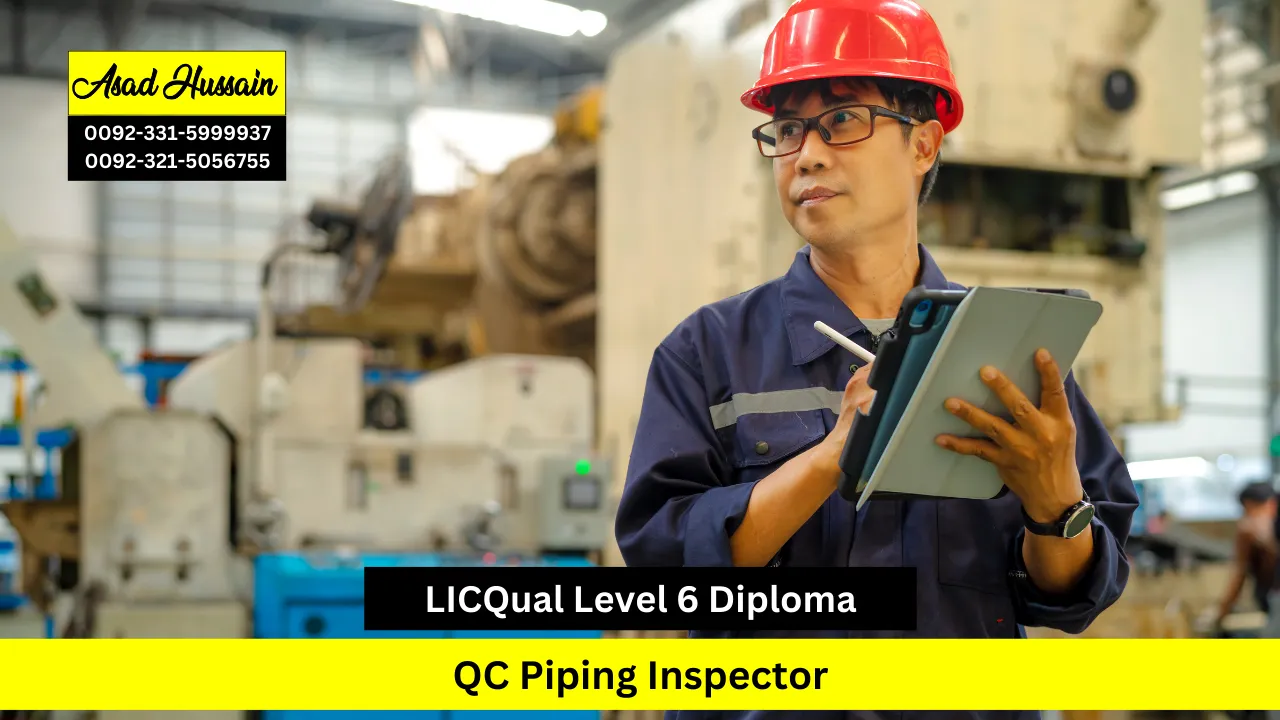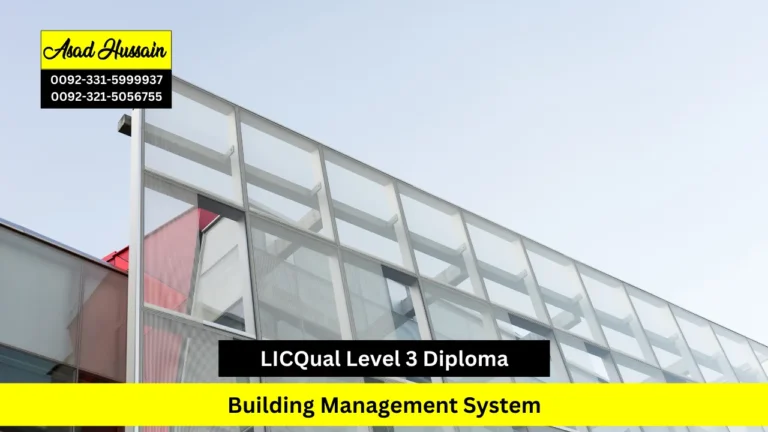Ensuring the safety, reliability, and performance of industrial piping systems is a critical responsibility in mechanical, construction, and manufacturing industries. The LICQual Level 6 Diploma in QC Piping Inspector is designed for experienced professionals who aim to achieve advanced expertise in piping inspection, quality control, and compliance management.
LICQual Level 6 Diploma in QC Piping Inspector provides learners with in-depth knowledge of QC principles, advanced inspection techniques, risk-based assessments, and international standards applicable to industrial piping systems. Participants will develop the ability to evaluate piping designs, perform sophisticated inspections, apply non-destructive testing (NDT) methods, and manage compliance with ASME, API, ANSI, and ISO standards. Emphasis is placed on integrating theoretical understanding with practical applications, allowing learners to address real-world challenges in piping inspection and quality assurance effectively.
Graduates will gain critical skills in advanced piping inspections, welding and dimensional evaluations, risk assessment, reporting, and strategic QC planning. The LICQual Level 6 Diploma in QC Piping Inspector also equips participants to lead inspection teams, implement best practices, and contribute to continuous improvement initiatives within industrial projects.
Upon completion, learners will be capable of overseeing complex piping projects, identifying potential defects, mitigating risks, and ensuring that systems meet the highest safety, quality, and compliance standards. LICQual Level 6 Diploma in QC Piping Inspector prepares professionals for senior roles such as lead QC piping inspector, mechanical QA/QC supervisor, or site inspection manager, enhancing career prospects and establishing recognized competence in industrial piping quality management.
Program Highlights
Mandatory Units
- Advanced Piping Inspection Strategies and QA/QC Management
- Non-Destructive Testing (NDT) Methods and Interpretation
- Welding Procedure Qualification and Welder Certification Audit
- Risk-Based Inspection and Failure Analysis in Piping Systems
- Quality Audits, Compliance, and International Regulatory Frameworks
- Capstone Project: Comprehensive QC Inspection Plan for a Live/Simulated Project
The LICQual Level 6 Diploma in QC Piping Inspector is designed for professionals seeking advanced expertise in piping inspections, quality control, and compliance management. To ensure learners are fully prepared for the program, the following entry requirements apply:
1. Age Requirements
- Applicants must be at least 21 years old to enroll in the course.
2. Educational Requirements
- Minimum of a Level 5 qualification in Mechanical Engineering, Piping Engineering, Industrial Technology, or a related field.
- Equivalent professional certifications or substantial practical experience in piping or QA/QC roles may also be considered.
3. Professional Experience
- Preferably 3–5 years of experience in piping projects, mechanical engineering, QA/QC supervision, or inspection roles.
- Experience with compliance, safety standards, risk-based inspection, and project management is highly advantageous.
4 . English Language Proficiency
- Non-native English speakers must provide evidence of proficiency, such as IELTS 6.0+ or equivalent, to ensure comprehension of course content and assessments.
The LICQual Level 6 Diploma in QC Piping Inspector equips learners with advanced knowledge, technical skills, and practical expertise required to oversee complex piping projects and ensure compliance with international quality standards. Graduates will gain the competence to implement strategic QC procedures, perform advanced inspections, and lead QA/QC initiatives in industrial and mechanical engineering environments.
1. Advanced Piping Inspection Strategies and QA/QC Management
- Develop advanced inspection strategies for complex piping systems across industrial projects.
- Implement QA/QC management plans aligned with project objectives and industry best practices.
- Coordinate inspection teams and resources to maximize efficiency and ensure quality compliance.
- Evaluate piping system performance and propose improvements for enhanced safety and reliability.
2. Non-Destructive Testing (NDT) Methods and Interpretation
- Apply advanced NDT techniques such as phased array, TOFD, and digital radiography to detect defects.
- Interpret NDT results accurately to identify potential failures and non-conformities.
- Integrate NDT findings into overall quality control and risk mitigation strategies.
- Ensure adherence to international standards and safety regulations during inspection procedures.
3. Welding Procedure Qualification and Welder Certification Audit
- Assess welding procedures and verify compliance with project specifications and codes.
- Conduct audits of welder certifications and maintain accurate documentation.
- Identify deviations or non-conformities in welding quality and recommend corrective measures.
- Ensure welding practices meet safety, performance, and regulatory standards.
4. Risk-Based Inspection and Failure Analysis in Piping Systems
- Perform risk-based inspections to prioritize areas of high criticality in piping systems.
- Analyze past failures and predict potential defects using structured methodologies.
- Implement proactive strategies to prevent system failures and reduce operational risks.
- Document risk assessments to support decision-making and maintenance planning.
5. Quality Audits, Compliance, and International Regulatory Frameworks
- Conduct internal and external quality audits to evaluate adherence to international standards.
- Ensure compliance with ASME, API, ANSI, ISO, and other relevant regulatory frameworks.
- Identify non-compliance issues and propose corrective and preventive actions.
- Integrate audit findings into continuous improvement processes and quality management systems.
6. Capstone Project: Comprehensive QC Inspection Plan for a Live/Simulated Project
- Develop a complete QC inspection plan for a real or simulated piping project.
- Apply theoretical knowledge and practical skills gained throughout the course.
- Demonstrate problem-solving, decision-making, and leadership in QC inspection activities.
- Present a detailed report and action plan that aligns with international quality standards and project requirements.
The LICQual Level 6 Diploma in QC Piping Inspector is designed for experienced professionals seeking advanced expertise in piping inspection, quality control, and compliance management. LICQual Level 6 Diploma in QC Piping Inspector is ideal for individuals aiming to assume senior roles in industrial, mechanical, or construction projects where the integrity, safety, and performance of piping systems are critical.
Educational Instructors and Trainers
- Professionals teaching mechanical engineering, piping systems, or QA/QC practices.
- Individuals looking to integrate advanced QC inspection techniques and compliance knowledge into their training programs.
Environmental Advocates and Activists
- Professionals promoting sustainable and safe industrial practices.
- Individuals focused on ensuring piping operations meet environmental compliance standards while maintaining quality.
Research and Development Teams
- Engineers and technical specialists involved in designing, testing, or optimizing piping systems.
- Professionals applying advanced QC inspection methods to improve reliability and operational efficiency.
Corporate Social Responsibility (CSR) Professionals
- Individuals ensuring organizational adherence to safety, quality, and environmental standards.
- Professionals integrating QA/QC strategies into CSR initiatives for industrial projects.
Students and Recent Graduates
- Learners seeking recognized Level 6 certification in QC piping inspection.
- Individuals aiming to enter or accelerate a career in industrial QA/QC, mechanical inspection, or project supervision.
Career Changers
- Professionals from related engineering or technical fields seeking specialization in advanced QC piping inspection.
- Individuals aiming to broaden career opportunities in quality assurance, industrial inspection, and project management.
Policy Makers and Regulators
- Professionals responsible for developing, enforcing, or monitoring industrial piping standards and safety regulations.
- Individuals requiring practical knowledge of QC inspection processes to inform policy and regulatory decisions.
This course equips learners with the advanced technical, analytical, and managerial skills required to lead piping inspection teams, implement strategic QC measures, and ensure compliance with international standards. Graduates will be prepared to pursue roles such as Lead QC Piping Inspector, Mechanical QA/QC Supervisor, or Site Inspection Manager, enhancing their career prospects in global industrial, mechanical, and construction environments.







